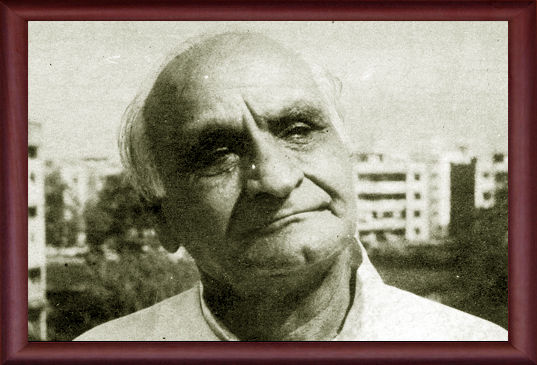Qamar Jalalabadi was born in a Punjabi family in 1917 in Amritsar, in a small town called Jalalabad, and was named Om Prakash. Right from the tender age of seven he starting writing poetry in Urdu. There was no encouragement from home, but a wandering minstrel poet named Amar met him in his hometown and encouraged him to write, recognizing his immense talent and potential. He also gave him the ‘takhallus’ of ‘Qamar’ which means moon, and Jalalabadi was added for effect because Qamarji hailed from that town. It was the general trend in those days for writers to name themselves after the towns they hailed from.
After completing his matriculation from Amritsar, Qamarji embarked on his journalistic career journey by writing for Lahore based newspapers like Daily Milap, Daily Pratap, Nirala, Star Sahakar. The lure of the Film industry brought him to Pune in the the early Forties. In 1942, he wrote lyrics for his first film Zameendar which was a Pancholi Pictures production and the songs of this film were very well received, especially the song sung by
Shamshad Begum 'Duniya me garibon ko aaraam nahi milta….rote hain to hasne ka paigaam nahi milta…', which also had a line or two written by writer and poet Behzaad Lucknowi.
Thereafter he shifted to Bombay with family and thus began an eventful career in the glorious film industry which went on for nearly 4 decades. His songs were elusive wordplays that made you ponder deeply, looking for the hidden depths that were left upon the listener to uncover. Although he wrote what the need of the moment dictated, his gentle personality seeped through his lyrics. Potent love, deep excruciating pain and longing, ecstasy beyond comprehension, also hurt and humiliation that one faces in life through no fault; in other words every itsy bitsy emotion a lover or beloved goes through in the tryst to acquire true love, were portrayed in his effervescent songs. Golden voices of the legendary singers like Noor Jahan, G M Durrani, Zeenath Begum, Manju, Amirbai Karnataki and many others added mesmeric glitz to Qamarji’s deeply meaningful songs; alongwith eclectic singers like
Mohd. Rafi,
Talat Mahmood,
Geeta Dutt, Suraiya,
Shamshad Begum,
Mukesh,
Manna Dey,
Asha Bhosle,
Kishore Kumar and the Nightingale of India
Lata Mangeshkar.
Not many people may know that the immortal composer
S D Burman had also rendered a comic song penned by Qamarji in the film Eight Days in 1946. The song was tuned by
S D Burman and the ticklish wordings were 'O babu babu re dil ko bachana bachana, tere dilka banega nishaana……'. Music composer
Sardar Malik had rendered a few soulful songs in his heydays, and Qamarji had written several ballads for him. One memorable song was from the film Renuka in 1947 'Sunti nahi duniya kabhi fariyaad kissi ki, Dil rota raha aati rahi yaad kisi ki…'. The regal Beauty of her times Naseem Banu sang a heart-wrenching ghazal penned by Qamarji 'Dil kis liye rota hai...pyar ki duniya me, aisa hi hota hai...' for the film Mulaquat in 1947. Dancing legend Sitara Devi emoted a few of Qamarji’s songs in the film Chand In 1944 and in this film she played a cameo role as the slim and svelte second leading lady alongwith the charming Begum Para and dashing hero Prem Adib. Chand was one of the earliest of Qamarji’s successful and memorable films.
As a lyricist he handled anything from the ridiculous to the sublime with equal deftness. On one hand he wrote mesmeric duets like 'Sun mere sajana dekhoji mujhko bhool na jana…' sung by
Lata Mangeshkar and
Mohd. Rafi (film: Aansoo 1953) and on the other hand he penned comic relief songs like 'Khush Hai zamana aaj pehli taareekh hai...' endured with full throttle gusto by
Kishore Kumar (film: Pehli Tarikh-1954). This song turned into veritable anthem and was played on Radio Ceylon on the first if every month for decades, and it probably still is. The film Howrah Bridge (1954) sky-rocketed his career as lyricist to unpredescented heights. Songs like 'Mera naam Chin Chin Chu..' (
Geeta Dutt) and 'Aaiye meherbaan, baithiye jane jaan…', (
Asha Bhosle) are still as breathtaking as ever, and are remembered far and wide for their rollicking tunes by Maestro Music composer
O P Nayyar as well as for the succulent lyrics. It is a sad thought though that very few people know who the writer of these songs is.
In his personal life he was a highly principled personality who had his own unique rules and beliefs. He began each day with prayers that comprised of loud chanting of excerpts from The Bhagwad Geeta, The Holy Koran as well as The Bible. He was deeply into transcendental meditation, and was mostly embedded in his writing for most part of the day.
He passed away on the 9th of January 2003.
Contributed by: Mrs. Subhashini Swar
(Daughter of the Lyricist)

